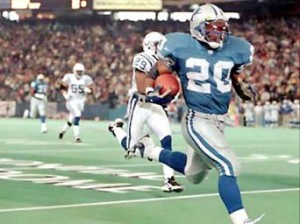Jason Pierre-Paul, New York Giants
No, I'm not going to comment on Jason Pierre-Paul's grammar. Rather my interest is in his use of first-person singular pronouns, four times in about two dozen words. This focus on himself came just after his Giants lost an NFL playoff game 38-13 to the Green Bay Packers, a time when a little humility might have been in order. Such boastfulness is common today, especially in the world of sports. It makes one long for more players like Barry Sanders, who after each spectacular touchdown run would simply hand the ball to an official and head back to the Detroit Lions bench.
 |
| Barry Sanders |
 |
| Frances Perkins |
There are other was ways to avoid first person, some of them sounding even more pompous. There is, for example, the "royal we," most familiar in the phrase "we are not amused." Then there are those people, such as Gen. Douglas MacArthur, who refer to themselves in third person. MacArthur, like most kings and queens, was not known for humility. Even so, third person may have seemed to him like a way to talk about himself while seeming to be talking about somebody else.
For most of us, we are better off following the examples of Barry Sanders and George H.W. Bush, simply letting our actions speak for us or, if we must speak, as a presidential candidate must, sharing the focus with others.
No comments:
Post a Comment